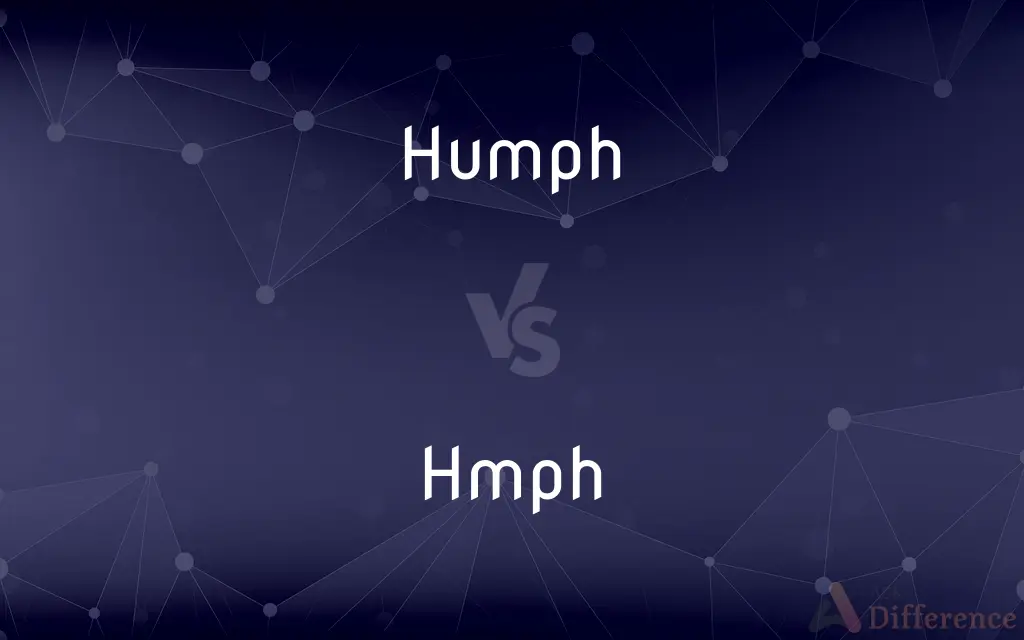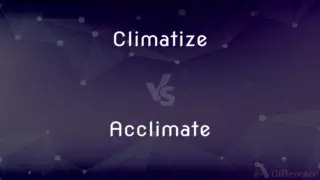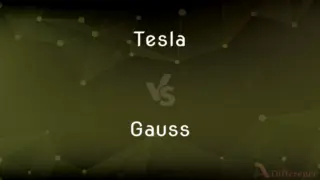Humph vs. Hmph — What's the Difference?
By Fiza Rafique & Urooj Arif — Updated on March 25, 2024
"Humph" is a word expressing scorn or disbelief, often used in literary contexts, while "hmph" is a less formal variant, typically found in casual or digital communication.

Difference Between Humph and Hmph
Table of Contents
ADVERTISEMENT
Key Differences
Humph is often found in written English, particularly in older texts or more formal writing, to convey a character's irritation or skepticism, whereas hmph is a more informal expression, frequently used in casual conversation, text messages, or social media to indicate annoyance, dissatisfaction, or disapproval.
When it comes to literary and formal contexts, "humph" can be used to add depth to a character's personality or to illustrate a moment of disbelief or disdain with a touch of formality or sophistication. On the other hand, "hmph" tends to appear in dialogues or narratives that aim to reflect contemporary speech patterns or informal communication, capturing the spontaneous nature of personal reactions.
The pronunciation of these interjections may vary slightly, with "humph" possibly being enunciated more fully to emphasize the speaker's feelings, while "hmph" might be uttered more abruptly or under one's breath, highlighting a momentary feeling of irritation or contempt.
In terms of visual representation in media, such as comics or graphic novels, "hmph" might be preferred for its brevity and ability to convey a quick, emotional response, whereas "humph" could be used in contexts that require a more pronounced or emphatic expression of the character's feelings.
The choice between "humph" and "hmph" can also reflect the writer's stylistic preference or the intended tone of the text, with "humph" suggesting a more traditional or deliberate expression, and "hmph" leaning towards a more modern or spontaneous utterance.
ADVERTISEMENT
Comparison Chart
Formality
More formal, found in literature
More informal, common in casual or digital communication
Context
Used in older texts or formal writing
Used in contemporary speech, text messages, and social media
Tone
Can convey irritation, skepticism with sophistication
Expresses annoyance or disapproval more abruptly
Pronunciation
Enunciated more fully
Uttered more abruptly or under the breath
Visual Representation
Preferred in traditional narratives
Favored in comics or graphic novels for brevity
Compare with Definitions
Humph
An expression of scorn, disbelief, or disapproval.
Humph, he said, clearly unimpressed by the explanation.
Hmph
Used to express mild contempt or disapproval.
Hmph, I've seen better, he commented under his breath.
Humph
Indicates a more pronounced reaction.
Humph! I would have expected better, he remarked.
Hmph
Suggests a modern, spontaneous utterance.
With a dismissive hmph, she turned her attention back to her book.
Humph
Found in literary or formal contexts.
The character exclaimed, Humph! upon hearing the outrageous claim.
Hmph
Common in casual conversation and digital communication.
Texting her friend, she typed, Hmph, that's hardly fair.
Humph
Reflects a traditional expression of emotions.
She gave a humph at the suggestion, dismissing it outright.
Hmph
Conveys a quick, emotional response.
He gave a quick hmph in response to the joke.
Humph
Used to signify irritation or skepticism.
With a humph, she turned away, unconvinced.
Hmph
An informal expression of dissatisfaction or annoyance.
Hmph, she muttered, scrolling through the comments.
Humph
Used to express doubt, displeasure, or contempt.
Humph
(onomatopoeia) A sound, usually made with a closed mouth pouting, indicating annoyance, indignation, disapproval, doubt, or sighing.
Humph
(intransitive) To utter "humph!" in doubt or disapproval.
Humph
An exclamation denoting surprise, or contempt, doubt, etc.
Common Curiosities
Do "humph" and "hmph" have the same pronunciation?
Their pronunciation may vary slightly, with "humph" potentially being more fully enunciated and "hmph" uttered more abruptly.
Is "hmph" acceptable in formal writing?
"Hmph" is generally considered too informal for traditional formal writing but may be appropriate in dialogues or creative works aiming to reflect casual speech.
How is "hmph" different from "humph"?
"Hmph" is a less formal variant of "humph," typically used in casual or digital communication to indicate annoyance or dissatisfaction.
How do "humph" and "hmph" function in dialogues?
In dialogues, they serve to convey the speaker's emotional response, with the choice between them reflecting the dialogue's formality and the character's personality.
What does "humph" mean?
"Humph" is an interjection expressing scorn, disbelief, or disapproval, often used in formal or literary contexts.
Why would an author choose "humph" over "hmph" in a narrative?
An author might choose "humph" for its traditional connotation or to fit the tone of a more formal or literary narrative.
Can "hmph" be considered a modern adaptation of "humph"?
"Hmph" can be seen as a modern, more informal adaptation of "humph," reflecting evolving language use in informal and digital communication contexts.
Can these expressions convey different emotions?
While both can convey irritation or disapproval, "humph" might carry a tone of sophistication or disbelief, whereas "hmph" tends to express a more immediate or casual annoyance.
Can "humph" and "hmph" be used interchangeably?
While they can be used interchangeably in some contexts, their usage often depends on the formality of the setting and the tone the speaker or writer wishes to convey.
How can I use "humph" or "hmph" in my writing?
Use "humph" to add a touch of formality or traditional expression to your characters' reactions, or "hmph" for a more casual, contemporary tone.
Is it common for people to actually say "humph" or "hmph" out loud?
Yes, people do say these interjections out loud, especially "hmph," which is commonly used in everyday speech to express mild annoyance or disapproval.
Do these terms have equivalents in other languages?
Many languages have their own interjections for expressing similar sentiments, though the exact sound and spelling may vary.
Are "humph" and "hmph" found in dictionaries?
Yes, both expressions can be found in dictionaries, often listed as interjections used to express feelings of discontent or disbelief.
Can the choice between "humph" and "hmph" influence a reader's perception of a character?
Yes, the choice can subtly influence how readers perceive a character's personality, sophistication, or emotional state.
Share Your Discovery

Previous Comparison
Climatize vs. Acclimate
Next Comparison
Tesla vs. GaussAuthor Spotlight
Written by
Fiza RafiqueFiza Rafique is a skilled content writer at AskDifference.com, where she meticulously refines and enhances written pieces. Drawing from her vast editorial expertise, Fiza ensures clarity, accuracy, and precision in every article. Passionate about language, she continually seeks to elevate the quality of content for readers worldwide.
Co-written by
Urooj ArifUrooj is a skilled content writer at Ask Difference, known for her exceptional ability to simplify complex topics into engaging and informative content. With a passion for research and a flair for clear, concise writing, she consistently delivers articles that resonate with our diverse audience.















































